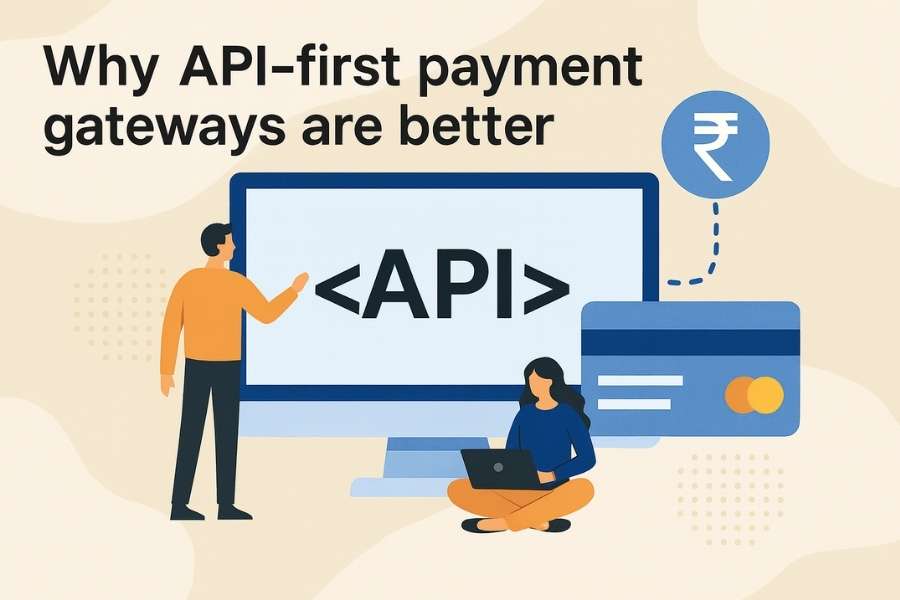According to Forbes, the e-commerce market is set to surpass $7.9 trillion by 2027. Online commerce is evolving at lightning speed, making agility a top priority for businesses that want to stay ahead. Brands that deliver seamless payment experiences across platforms, channels and customer touchpoints stand out from the rest
The choice of online payment gateways is a strategic decision that directly impacts business growth, customer satisfaction and innovation.
Increasingly, API-first online payment gateways have emerged as the preferred solution for modern businesses looking for fast, flexible integration. So what is an API-first approach, and why does it matter for payment infrastructure? Here’s what you need to know.
The evolution of online payment gateways
The growth of digital transactions has pushed businesses to rethink how they integrate payment solutions. Online payment gateways have become central to the success of any online business, moving far beyond their earlier role as simple add-ons.
Traditionally, they were built as closed monolithic systems. Integrating these solutions into websites or apps could be a long, complex process requiring significant custom code and developer resources. Even small changes like adding a new payment method or updating compliance features could demand weeks of work and disrupt the customer experience.
As digital ecosystems have expanded and customer journeys have become more complex, the need for flexibility and speed in integrating online payment gateways has only grown. That is where API-first payment gateways have revolutionised the landscape.
What does API-first mean for online payment gateways?
API-first online payment gateways are designed with the developer experience at their core. The entire solution is built around an advanced API that makes every feature easily accessible and customisable.
Rather than retrofitting APIs onto existing products, API-first online payment gateways start with APIs as the foundation. This results in well-documented, developer-friendly tools that make it easy to add payment processing, refunds, security features and much more.
For businesses that want maximum flexibility, an API-first approach allows you to build payment experiences tailored to your needs across all channels.
The advantages of API-first online payment gateways
Businesses are discovering several major benefits when switching to API-first online payment gateways. The following advantages explain why these platforms are setting the standard for modern integration.
1. Faster time to market
API-first online payment gateways allow developers to plug in payment functionality quickly without the delays of traditional, tightly coupled systems. Ready-to-use code samples, test environments and clear documentation mean new features can go live in days, not months.
This speed is a game-changer for startups launching MVPs or established brands rolling out new product lines.
2. Maximum integration flexibility
Every business is unique. API-first payment gateways offer flexibility to design and build payment flows that fit your exact needs. If you want to customise the checkout UI, support one-click subscriptions or automate reconciliation, the APIs give you control.
Businesses can integrate with existing CRM, ERP or accounting tools with minimal friction.
3. Easier updates and futureproofing
The pace of change in payments is relentless. New payment methods, regulations and security standards appear all the time. API-first online payment gateways simplify updates.
When a provider launches a new feature or adds compliance support, it is available instantly through the API. Your team can roll out improvements with minimal code changes and without affecting the entire system.
4. Seamless omnichannel experiences
Customers interact with businesses through multiple channels. API-first online payment gateways make it possible to offer consistent payment options and loyalty programmes across web, app and even physical PoS machines.
With a single integration, businesses can manage all these channels seamlessly and deliver a unified payment experience to their customers. This reduces customer friction, supports higher conversion rates and improves overall brand loyalty.
5. Better developer experience
Well-documented APIs, SDKs and sandbox environments mean developers spend less time troubleshooting and more time building. Many payment gateways provide dedicated support, sample code and community forums. This accelerates onboarding for new developers and reduces the total cost of ownership.
6. Improved scalability and reliability
API-first architecture means online payment gateways can scale with your business. Cloud-based APIs handle spikes in traffic, seasonal peaks or sudden growth without compromising performance. Decoupled microservices help ensure reliability, so even if one component needs maintenance, payments keep flowing smoothly.
7. Enhanced security and compliance
Security is fundamental for online payment gateways. API-first solutions are designed for secure data handling, tokenisation and PCI DSS compliance from day one. Centralised control through APIs also enables easy monitoring, logging and access management. When regulations change, updates can be rolled out instantly across all integrations.
Real-world use cases for API-first online payment gateways
The impact of API-first design goes beyond theory and is already delivering results for leading businesses. Let’s look at how some of India’s most agile companies benefit from API-first payment integrations:
- E-commerce: Fast-growing online retailers can offer new payment methods like Buy Now Pay Later or UPI instantly, respond quickly to festive rushes and adapt their checkout flows for different customer segments.
- Fintech platforms: Loan apps, mutual fund sites and insurance aggregators can embed payments, automate recurring billing or design custom onboarding journeys, all through advanced APIs.
- Marketplaces: Platforms handling multiple vendors can automate settlements, issue split payments and manage refunds easily without building everything from scratch.
- Subscription businesses: Media, SaaS or education brands can automate billing cycles, send instant payment reminders and manage upgrades or downgrades with a single API integration.
By harnessing API-first online payment gateways, businesses in every sector can adapt faster, innovate at scale and deliver better experiences for every user.
The future belongs to API-first online payment gateways
The shift to API-first integration is changing the way businesses approach online payments. By opting for online payment gateways that put APIs and developer experience first, companies unlock faster, more secure and highly adaptable solutions.
Payment gateways such as Pine Labs Online make it possible for organisations to deploy seamless payment systems that scale as business needs evolve. If you are planning to upgrade your payment infrastructure or launch a new product, now is the ideal time to explore API-first payment gateways. The right partner will ensure your payment experience is as innovative as your business.




